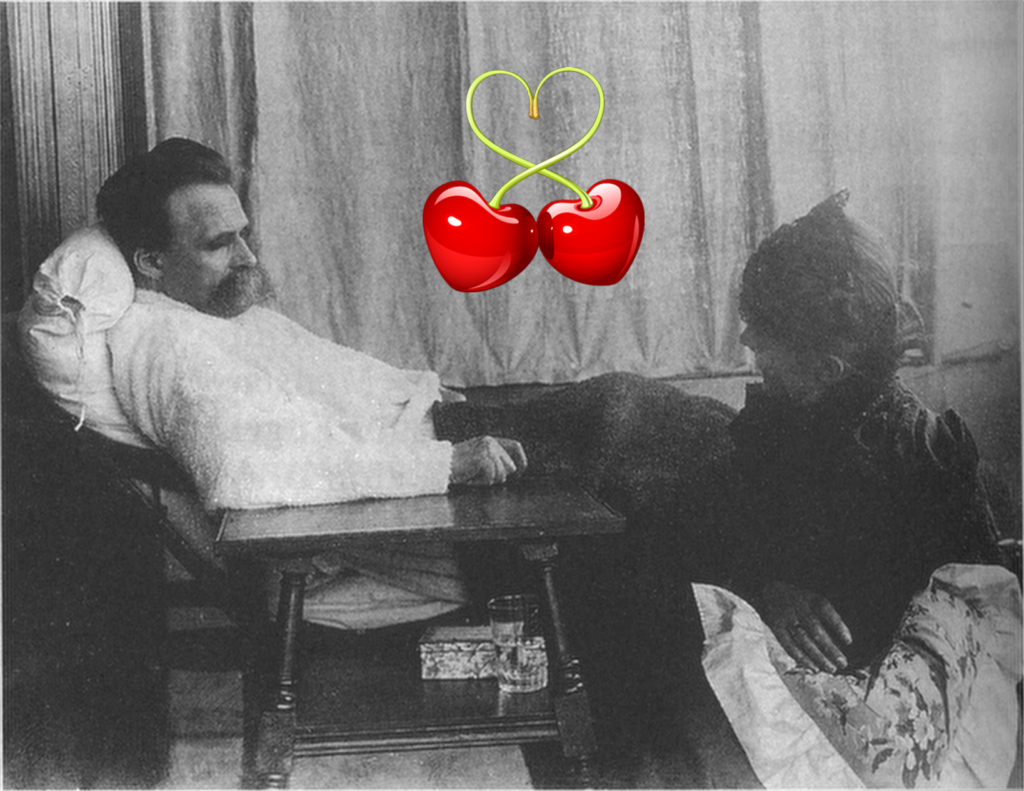
Hans Olde, from “Der kranke Nietzsche” (“The ill Nietzsche”), June–August 1899. Goethe- und Schiller-Archiv Weimar.
After two vodka tonics and a cosmo, my ninety-year-old grandmother lifts her glass and says, “But you know that Nietzsche is my boyfriend?”
“He is?”
“He’s my boyfriend.”
It’s all right—we’ve shared boyfriends before. The actor Javier Bardem. Errol Louis, anchor at NY1. Her new neighbor. Her many doctors. She tells me that Nietzsche is her boyfriend because Nietzsche also hates the German composer Richard Wagner. I tell her Nietzsche hates a lot of people. She nods. “That’s good in a man.”
Earlier in our dinner I’d mentioned I was finally reading Nietzsche’s Twilight of the Idols and The Antichrist—two white-hot texts that serve, in part, as the ecstatic summation of much of Nietzsche’s previous work. Both works glow with special invective. The usual targets are abused (Socrates, Kant, et cetera). So are George Sand, George Eliot, and, of course, generally happy people: “Nothing could make us less envious than … the plump happiness of a clean conscience.” It’s in Twilight that Nietzsche announces, “The man who has renounced war has renounced a grand life.”
Would he be a good boyfriend? He’d be a fierce one, often railing at the “radical and mortal hostility to sensuality.” He’d remind you: “When a man is in love he endures more than at any other time; he submits to anything.” Would he wink? Probably not.
Freud claimed, apparently, that Nietzsche “had a more penetrating knowledge of himself than any man who ever lived or was likely to live.” In these final writings it is clearer than ever how Nietzsche’s “hate” evolves out of a prolonged annoyance at knowing people—and history and philosophical systems—better than they know themselves. You sense the loneliness of this awareness. Nietzsche needs his supernatural, self-generating heat, lest his flame down there wither in the wild pits of instinct. (“Nothing ever succeeds which exuberant spirits have not helped to produce.”) If he was your lover, he’d remind you, his torch high, that “one must be superior to mankind in force, in loftiness of soul—in contempt.” Those who cannot achieve this are “merely mankind.”
I look at my grandmother, whose awareness—as Nietzsche might recommend—seems to recede from the outside world as it advances internally. She closes her eyes. I think she’s slipped under when she points at me. “First it’s our Spanish fellow. Then that other fellow. Then Nietzsche.”
—Sophie Madeline Dess, author of “Zalmanovs”
A friend whose taste I trust recently recommended Denton Welch’s 1945 novel In Youth Is Pleasure, a beautiful little book and one of my favorite discoveries of 2022. Welch’s writing is impressionistic, playful, homoerotic, dreamy, often hilarious, and at times ecstatic. What plot there is centers on the fifteen-year-old Orvil Pym, who is spending the summer holiday with his father and brothers at a hotel in Surrey several years before the outbreak of World War II. Orvil’s mother has died; his feelings for his siblings and for his father (who has bestowed upon him the nickname “Microbe”) range from vague fondness to childish terror and loathing. Often Orvil is left alone. He eats pêche Melba (“‘It’s like a celluloid cupid doll’s behind,’ said Orvil to himself. ‘This cupid doll has burst open and is pouring out lovely snow and great big clots of blood’”); he spies jealously on a schoolmaster reading Jane Eyre to two boys, one of whom appears to be taking a particular kind of gratification from the experience; he desecrates a church with libidinal glee, throwing himself on a brass statue and kissing its face “juicily.” At the end of the day, Orvil always seems to be consuming oozing cakes in the hotel dining room, dressed in mud-stained clothes.
This is a lonely book, and a remarkable one for the way in which its sensuality emerges: from inside this loneliness. Orvil takes an aesthete’s pleasure in the physical world but also in the eruptions of his own consciousness; much of the novel’s eroticism arises from his encounters with a kind of other within the self. Desire, enchantment, the delights of reverie and of metaphor—these spring from within. Floating alone along a river, Orvil thinks, “I’m like one of those Baked Alaskas … one of those lovely puddings of ice-cream and hot sponge.” Here, loneliness can be devastating, mischievous, grotesque, monstrous, thrilling—but it is never grim.
—Avigayl Sharp, author of “Uncontrollable, Irrelevant”
from The Paris Review https://ift.tt/iFXBvfI
Comments
Post a Comment